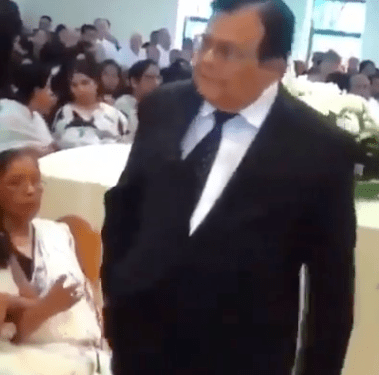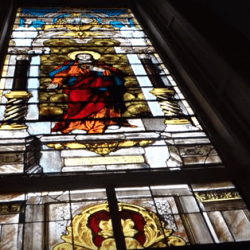That appears to be exactly what happened in the video below, posted on Twitter last week. It’s unclear where or when this was taken. But it’s gotten a lot of attention and generated a fair amount of comment.
You can see it for yourself here.
It’s pretty outrageous, any way you slice it.
But I have questions.
Why was someone recording this particular man going up to receive communion (at what was, clearly, a funeral)? The man seems to look at the camera as he walks by.
Why did the person videotaping it let him just walk away?
Why did the person giving out communion let him walk away without consuming the Body of Christ then and there?
There are a lot of things not right about this — including the circumstances surrounding the taping.
It looks suspiciously like a stunt. But it’s also similar to the moment captured on video several years ago in Costa Rica:
Anyone who receives communion should know this: consume the host in the presence of the minister of communion — whether priest, deacon or EMHC — before walking away.
More than once, I’ve had to stop people who wandered away carrying the host. If you see anyone doing this, stop them. Usually, it’s nothing more than ignorance. This tends to happen around Christmas or Easter, when the church is packed with people who don’t normally go to Mass or who don’t regularly receive communion; in fact, some who receive may not even be Catholic.
That might be the case in the video above. Funerals and weddings very often have many in the pews who are unchurched or lapsed. Others just don’t know any better.
At those occasions, a reminder like this one from the USCCB — which appears in many bulletins and on the back of many missals — might be helpful:
FOR CATHOLICS
As Catholics, we fully participate in the celebration of the Eucharist when we receive Holy Communion. We are encouraged to receive Communion devoutly and frequently. In order to be properly disposed to receive Communion, participants should not be conscious of grave sin and normally should have fasted for one hour. A person who is conscious of grave sin is not to receive the Body and Blood of the Lord without prior sacramental confession except for a grave reason where there is no opportunity for confession. In this case, the person is to be mindful of the obligation to make an act of perfect contrition, including the intention of confessing as soon as possible (canon 916). A frequent reception of the Sacrament of Penance is encouraged for all.FOR OUR FELLOW CHRISTIANS
We welcome our fellow Christians to this celebration of the Eucharist as our brothers and sisters. We pray that our common baptism and the action of the Holy Spirit in this Eucharist will draw us closer to one another and begin to dispel the sad divisions which separate us. We pray that these will lessen and finally disappear, in keeping with Christ’s prayer for us “that they may all be one” (Jn 17:21).Because Catholics believe that the celebration of the Eucharist is a sign of the reality of the oneness of faith, life, and worship, members of those churches with whom we are not yet fully united are ordinarily not admitted to Holy Communion. Eucharistic sharing in exceptional circumstances by other Christians requires permission according to the directives of the diocesan bishop and the provisions of canon law (canon 844 §4). Members of the Orthodox Churches, the Assyrian Church of the East, and the Polish National Catholic Church are urged to respect the discipline of their own Churches. According to Roman Catholic discipline, the Code of Canon Law does not object to the reception of Communion by Christians of these Churches (canon 844 §3).
FOR THOSE NOT RECEIVING HOLY COMMUNION
All who are not receiving Holy Communion are encouraged to express in their hearts a prayerful desire for unity with the Lord Jesus and with one another.FOR NON-CHRISTIANS
We also welcome to this celebration those who do not share our faith in Jesus Christ. While we cannot admit them to Holy Communion, we ask them to offer their prayers for the peace and the unity of the human family.
Of course, the Church could also mandate receiving the Eucharist kneeling and on the tongue, which would put an end to the kind of abuse seen in the video.
I’ve shared some thoughts on that before. Take a look.













